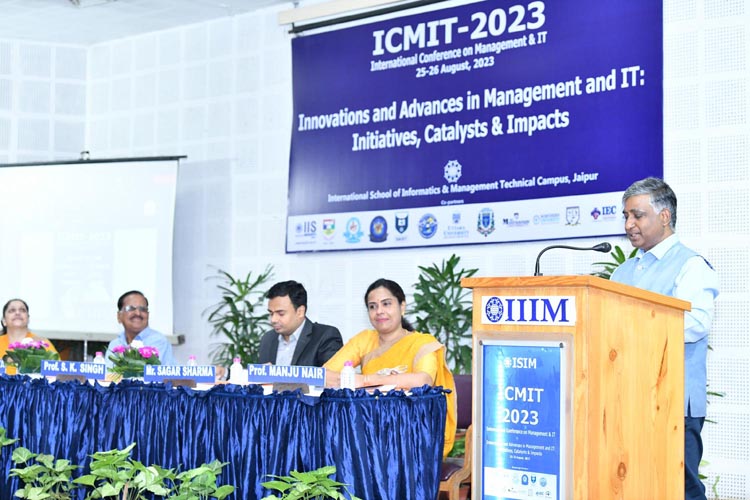-
For Admission Apply Now
-
Online Fee MBA I MCA
-
 Call Now ! +0141-2781154
Call Now ! +0141-2781154 -
 Email Now iiim@icfia.org
Email Now iiim@icfia.org



The 13th International Conference on Management and Information Technology (ICMIT) was held on August 25-26, 2023 at ISIM Jaipur. The conference's theme was "Innovations and Advances in Management and IT: Initiatives, Catalysts & Impacts".
ICMIT 2023 brought together corporate leaders, academicians, researchers, and experts from different sectors to network and share innovative concepts and technologies. The conference received responses from over 70+ research papers and expert talks under various themes and sub-themes of the technical sessions covering a wide range of topics from countries including Bangladesh, Brazil, Canada, Turkey, Nigeria, Africa and UAE.
The conference was hosted in collaboration with Bingham University, Nigeria, BLS Bizotto Academic Advisory Company, Brazil, Institute for Leadership and Development Communication, Nigeria, South Asian Institute for Social Transformation (SAIST), Bangladesh, India Education Centre (IEC) University, Himachal Pradesh, Northern University, Bangladesh, National University of Life and Environmental Sciences, Ukraine, PSNA College of Engineering and Technology, Tamil Nadu, India, Uttara University, Bangladesh, Millennium University, South East Africa, National Aviation University, Ukraine, Abhilashi University, Himachal Pradesh, India and IIS(deemed to be University), Rajasthan, India.
The conference began with a prayer for the almighty's blessings and the lighting of a lamp.
Through her Welcome Address, Prof. Roopa Mathur, Director, ISIM, Jaipur, marked the commencement of the two-day conference. Prof. Mathur highlighted the importance of innovation and technology in management. She stated that innovation is essential for organizations to stay ahead of the competition and to create new value for their customers. She also emphasized the significance of technology in facilitating innovation and transforming business operations.
The welcome address was followed by an introduction to the conference by Prof. Manju Nair, Principal, ISIM. She provided an overview of the organisation of the conference. Prof. Nair shared that the world is rapidly changing, and businesses must continuously innovate to remain competitive. IT plays an ever-increasing role in innovation, and we must know the most recent trends and technologies. She also highlighted the significance of ensuring innovation's sustainability in the context of changing environmental conditions.
The inaugral address was delivered by Prof. S. K. Singh, Vice Chancellor of the Rajasthan Technical University, Kota the chief guest of the event. Sir emphasized the contribution of Innovation and Technology to bringing about flexibility and empowerment in the form of online global education and opening opportunities to work from home for global companies. Sir added Innovation's contribution to enhancing life's quality.
Mr. Sagar Sharma, Chief Technical Officer, Azure Solution Architect, Shell, Netherlands, was the event's Guest of Honor. Mr. Sharma imparted his knowledge and ideas on the conference topic and emphasized the importance of IT in decision-making. Today, the development of businesses is driven by decisions supported by research, and IT provides the necessary support to facilitate this research process for the researchers.
After the tone for the conference was set by the distinguished personalities, the book of abstracts of the papers accepted for presentation was released.
Paper Presentation-Track 1: Innovations and Advances in Entrepreneurship
The session on paper presentations on Track 1 was chaired by Prof (Dr.) Ampu Harikrishnan, Registrar, Himgiri Zee University, Dehradun, Uttarakhand and Dr. Kavya Saini, Associate Professor, International School of Informatics &Management, Jaipur.
Track 1 included 13 research paper presentations that encompassed various themes such as the Gig Economy, the Tourism Business, the Vital Role of HRMs in encouraging new initiatives, ethical issues in Green Packaging, the integration of ESG and Sustainability, the significance of Water Management, the use of Neuro-Probabilistic Functionalism in Endoscopy to name a few.
Rapporteur of the session was Dr. Monika Rathore, Associate Professor, ISIM.
Technical Session-I "Innovations and Advances in Entrepreneurship"
The keynote speakers for technical session I were Professor (Dr.) Elizabeth White Baker, Associate Professor of Information Systems at Virginia Commonwealth University in Virginia, United States of America; Professor (Dr.) Varinder Singh Rana, Department Chair of the Department of Hospitality and Tourism Management at City University College of Ajman in the United Arab Emirates; and Dr. Abeer Jaber AbuIyada, Department of Education at the United Nations Relief and Works Agency (UNRWA) in Gaza, Palestine.
Prof. Elizabeth White Baker, PhD, gave her opinions on "Applied Ethics of Generative, Autonomous AI Systems". Dr. Baker emphasized the importance of ethical principles for creating and deploying generative artificial intelligence systems, examining the possible benefits and risks of the technology and their contribution to the protection of people's rights and the interests of the general public.
Prof. (Dr.) Varinder Singh Rana discussed his thoughts on "Collaborative Research: Opportunities and Actions." Dr. Rana explained that collaborative research is an effective method that can be utilized to find solutions to complex problems and to develop new goods and services. Research conducted in collaboration with others can significantly improve the world, provided the appropriate steps are taken. Research conducted in collaboration is an effective method that can be utilized to find solutions to complex issues.
On the topic "The Role of Network Leadership in Catalyzing Change at Educational Institutions in Palestine," Dr. Abeer Jaber AbuIyada stated that Leadership in a network is a potent instrument that may be used to catalyze change in educational institutions. Network leaders can significantly impact how education is provided if they focus on cultivating relationships, promoting collaboration, developing a shared vision, and bringing together resources.
PAPER PRESENTATIONS-TRACK -2 (PARALLEL TRACK): Trends in Business Management
Parallel paper presentations were held for in the session on Track 2, which Dr. Bhumija Chauhan, Associate Professor, International School of Informatics & Management, Jaipur and Dr. Sandeep Vyas, Associate Professor, International School of Informatics & Management, Jaipur chaired.
Various topics were discussed in the 12 research papers presented during Track 2 of the conference. Issues that Affect Female Business Owners in Micro, Small, and Medium-Sized Enterprises, Digital Transformation, Artificial Intelligence Stocks, Circular Economy, Metaverse, and Edtech Startups.
Dr. Gargi Sharma, Associate Professor at ISIM, wasRapporteur for Track 2.
TECHNICAL SESSION -2: TRENDS IN BUSINESS MANAGEMENT
The technical session two on "Trends in Business Management" was graced by distinguished delegates, including Prof. (Dr.) Glenn Muschert, Khalifa University Abu Dhabi, UAE, Dr. Mohammad Habibullah, Academic Fellow IIUM Gombak Campus, Institute of Islamic Banking and Finance, International Islamic University, Malaysia, Mr Abid Aziz, Advisor, Admission & Promotion, Uttara University, Dhaka, Bangladesh and Mr. Abdul Hakim, Chief Marketing Officer, Hoorain HTF Limited, (Jamuna Group), Dhaka, Bangladesh.
Prof. (Dr.) Glenn Muschert discussed "Financial Inclusion: In Pursuit of UN SDG 8.10." Prof. Glenn emphasized the importance of financial inclusion for economic development and poverty reduction. By ensuring that everyone has access to financial services, we can assist individuals in enhancing their lives and contributing to the economy's expansion. He also stated that India has made significant strides in financial inclusion over the past few years, but much must be done.
The Significance of Islamic Bonds (SUKUK) in Green and Sustainable Islamic Finance for Social Prosperity Realizing ESG was the topic of Dr. Mohammad Habibullah's address. He emphasized that Sukuk have the potential to be an effective financing tool for green and sustainable initiatives. He said that, investing in these initiatives, investors can contribute to job creation, environmental improvement, and the conservation of natural resources.
On the topic "Redefining Higher Education with Technology and Innovation: Possibilities and Responsibilities," Mr. Abid Aziz stated that technology cannot replace human interaction. Students still need to have the opportunity to develop supportive relationships with their teachers, counsellors, and other adults. However, in higher education, technology can be a valuable tool for enhancing students' mental health and well-being.
Mr. Abdul Hakim shared that the textile and apparel industry is a significant source of employment for women in many countries, especially in developing countries. The industry provides jobs for millions of women, who often have limited other employment opportunities. The textile and apparel industry has the potential to make a significant contribution to socio-economic reformation and human development through women's workforce and poverty alleviation. By creating jobs, generating income, providing opportunities for skill development, and empowering women, the industry can help improve the lives of millions of women worldwide. The textile and apparel industry can positively promote women's workforce and poverty alleviation sustainably and ethically.
PAPER PRESENTATIONS – TRACK-3 Innovative Solutions in Information Technology
The chairpersons for track 3 were Dr. N. K. Joshi, Director, Modi Institute of Management & Technology, Kota and Dr. Aruna Dhamija, Professor and Associate Head, Institute of Business Management, GLA University, Mathura.
Track 3 had 15 research paper presentations that covered a wide range of topics. These topics included chatbots in real estate, integrating AI technologies in legal processes, dialogue-based NLP models, smart farming, Hadoop's big data, and neuromorphic computing.
Associate Professor at ISIM in Jaipur, Dr. Manju Lata Joshi, acted as the Rapporteur for Track 3 during the conference.
The second day commenced with a Panel Discussion on the “Developing an Innovation Ecosystem” theme. The eminent panellists were Prof. Anil Mehta, Professor of Management, Department of Legal Studies, Banasthali Vidyapith, Rajasthan, Prof. (Dr.) Nazrul Islam, Pro Vice Chancellor, Northern University Bangladesh, Dhaka, Bangladesh, Mr. Deepak Kumar, Principal Engineer (Analytics) –Nagarro, New Delhi, Mr. Himanshu Gupta, IIT Delhi Alumni, Lead Data Scientist, Tiger Analytics, Chicago, USA, Mr. Mehdi Hasan, Head, Sales, TechXhub, Dubai, Mr. Vivek Sharma, CEO, Fairmont Hot Springs Resort, British Columbia, Canada, and Mr. Vinay Jeswani, Marketing Director, Ravis, Bangkok, Thailand.The panellists discussed the benefits of an innovative ecosystem.
Prof. Anil Mehta said innovation ecosystems may boost economic growth by producing new employment, firms, and industries. It improves life by creating new products and services to address social and environmental issues.
Prof. (Dr.) Nazrul Islam argued that creating an innovation ecosystem is difficult but necessary for economic growth. Governments and businesses can build strong and vibrant innovation ecosystems by investing in R&D, creating a culture of innovation and risk-taking, supporting entrepreneurs, training and upskilling the workforce, and connecting ecosystem actors.
Mr. Deepak Kumar noted that regulations can hinder innovation. Excessive restrictions or outdated technology may cause this. An innovation ecosystem needs talented workers to turn ideas and technologies into products and services. Mr. Vinay Jeswani suggested investing in education and training. Mr. Vivek Sharma stated that new ideas and technologies require a robust research and development foundation in India. This can be encouraged by investing in universities, research institutions, and other R&D groups he said.
Mr. Himanshu Gupta said that developing an innovative environment is crucial for India. The Indian youth population is expanding, and many are STEM-savvy the company therefore has a bright future. IT and pharmaceutical innovation are also vital in the country as seen in the last two years. India is struggling to build an innovation ecosystem but holds an encouraging base. Mr. Mehdi Hasan said universities and research institutes are essential to innovation, working on cutting-edge research. Startup incubators, accelerators, and venture capital firms are increasing. The ecosystem of incubators, accelerators, and venture capital firms that support entrepreneurs is expanding.
Prof. Anil Mehta moderated the session and concluded it with interesting anecdotes.
TECHNICAL SESSION -3: INNOVATIVE SOLUTIONS IN INFORMATION TECHNOLOGY
The speakers for technical session 3 were Dr. Mohiuddin Md. Al-Amin, Asst. Professor, Department of Law, Northern, University, Dhaka, Bangladesh, Prof (Dr.) Sheng Lung Peng, National Taipei University of Business, Taipei, Republic of China, and Prof (Dr.) Phil Harris, Professor Emeritus, University of Chester, United Kingdom.
Dr. Mohiuddin Md. Al-Amin shared his views on ‘A Patent Application in Bangladesh under the New Bangladesh Patent Act 2022: A Legal Study’. He said the Act significantly improved over the previous Patents and Designs Act 1911. It is more in line with international standards and provides a more robust framework for protecting patent rights in Bangladesh.
Prof (Dr.) Sheng Lung Peng shared his thoughts on “Utilizing Strong Dominance in Influence Maximization.” Prof. Peng shared that influence maximization is the problem of finding a small set of nodes in a social network that, if influenced, will maximize the spread of influence to the rest of the network. Strong dominance is a property of a node in a social network, meaning that if the node is influenced, all of its neighbours will also be influenced.
Prof. (Dr) Phil Harris shared his thoughts on “Reflections on life and family: The impact of culture on family business owner decision making in the inter-generational succession process”. Prof Harris highlighted that the impact of culture on family business owner decision-making in the inter-generational succession process is a complex and multifaceted issue. There is no one-size-fits-all answer, as the specific impact of culture will vary depending on the particular family and business involved.
All the paper presenters and registered participants were awarded certificates for their contribution to the conference. Selected papers presented at the conference will be published in the special issue of Oorja.